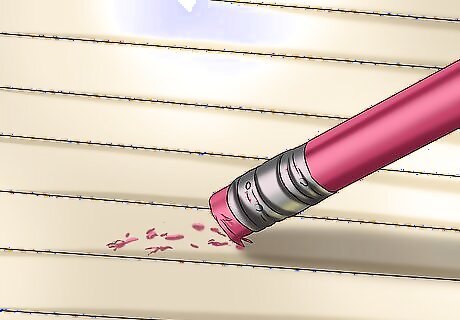
views

Consider how you actually feel on a day to day basis. Are things always confusing, messy and at crisis point? Do small things set you off? Are you liable to see shades of fluorescent where others see the calm pastels? For example, when someone asks you "how is you day?", what is your response likely to be? Your response may not feel like the real you because you're overtaken with the need to get your emotions outside of you, as a coping mechanism.

Learn to spot your emotions taking control. When you feel in the ways described in the previous step, it's important to ask yourself: "How will I get a handle on my emotions?" In fact, it's very simple. You have multiple choices as to the ways in which you'll handle your emotions. You can handle your emotions as you see fit, either by reacting to them and letting them run away with you, or by slowly stepping back (mentally speaking) and viewing them with a neutral perspective, to find a way to calm them and set yourself back on an even keel. Realize that when you respond to things based purely on your emotional reaction, you are likely to lash out, blame someone for something or do or say something you later regret (such as calling a BFF a bad name, or storming out on your boss).

Find ways to self calm and to pull yourself through emotional minefields. There are some good approaches that can help you and you'll always continue to find more as you stay true to this journey of self care, remaining open to letting in the calm. Some of the ways that might work for you to begin with though, include: Writing: Write about how you feel. For an example: Write yourself a question about how you feel and answer it or write a story. The character need not even be you––if it helps you to distance yourself and see how John or Martha would deal what you're going through, that's cool too. Talking it through: Sit down with a close friend or family member and talk about it. Often being heard is the most cathartic and freeing thing in the world. The trick is to find someone who is not judgmental and who is not too ready to offer what they'd do in your shoes. Find, and treasure, those who listen and support, who make kindly suggestions only when it's clear that's what you're after. Confrontation: Discuss your problem with the person or persons causing the issues. Remember that this doesn't need to be done straight away. It is something that you can come back, when the air is cleared and you both feel calmer. An apology is always a good way to get the ball rolling if you lost your temper, then both of you can set down to the business of sorting out things constructively, in a mature manner, together. Prayer, meditation or reflection: If you are a believer in a faith, you could pray to God or a god, depending on what you follow. If you'd prefer to meditate or think deeply over the matter without involving faith, that's fine too. The reality is that you need a spiritual or self-healing space in which to stand back and work through what is going on and why your emotions get the better of you. In some cases, if religious, you may find it helpful to go to the church/mosque/synagogue/temple and talk to one who has a designated role as a healer, someone willing and able to walk you through the issues.

Bear in mind that there are many struggles in life. They come and go like the waves on the ocean, hitting full force sometimes, receding at others. There is no promise of smooth sailing at any point in life. When you're over one struggle, another may be looming close by or it may be a long way off. But rest assured, struggles have their way of returning. The answer is to find your own inner peace, your inner strength and way of coping when the struggles return. Most of all, do not make it harder than it needs to be; your inner harsh critic and emotional poltergeist does not need feeding or rewarding. In plain words––does it make any difference to the outcome if you worried and beat yourself up or stayed calm and proceeded in a clear and methodical way? To the outcome, no; to you, yes, as you will be far more settled, healthy and resilient if you take the calm route.

Remind yourself of what you gain from struggles. The struggle of today is the gaining of the inner strength you need for tomorrow. Struggles are when your true character has a chance to come forth, and it is often a time to let go of those people who have an unhealthy hold over you because this becomes clear to you. Struggle informs you that you are ultimately personally responsible for standing up for yourself and for understanding what truly matters in your life. Tell yourself this wonderful saying when it all feels too much: "A smooth sea never made a skillful sailor."

Keep a record of your choices made. Note what precedes and follows the good and the bad choices. This will allow you to practice more of what results in the good choices and to catch yourself before doing or thinking the things that lead to bad choices. And while only you can know yourself and your modus operandi when it comes to the deep inner thoughts, do listen to other people's comments on how they view your reactions and coping skills––often it is from the outsider's perspective that you can learn to kinder to yourself and to make the most of the good they see in you.

Slow down. Make your choices in a calm state, when you aren't pressured or feel confused and pushed about. If you keep ending up in environments where this happens, realize that you're probably amid people with a similar mindset, the "urgency junkies" and "drama makers", who thrive on last-minute decisions that lack serious consideration. This isn't healthy for you, it isn't healthy for society as a whole and it is a definite source of unneeded struggles. If you haven't time to think through the consequences of your choice, you haven't got what you need to make a good choice. Sleep on it.

Learn from your mistakes. You often won't learn how bad or good a decision was until the consequences begin to show. That said, it is possible to be sensible, responsible and wise-headed about the decisions you do make. Inform yourself, ask questions of others and be clear about your intentions. These things help you to make a decision that is at least based on the best possible information and understandings at the time. And, when things do go wrong as a result of your decisions, learn from this. Know what should and should not be done next time. Admit to mistakes and look at those opportunities as a chance to get back in touch with your values. Prioritize the long-term over the short-term.

Maintain your integrity. Have good values, know yourself (the bad, the good, the indifferent) and strive to keep showing your best self to others. It is through your integrity that you will do, as C.S. Lewis once said, "the right thing, even when no-one is watching."




















Comments
0 comment